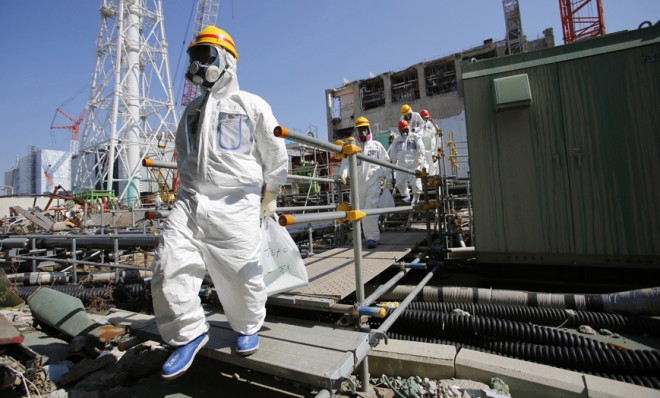Why the Fukushima radioactive leak is worse than we thought
"This is what we have been fearing. We cannot waste even a minute."


A free daily email with the biggest news stories of the day – and the best features from TheWeek.com
You are now subscribed
Your newsletter sign-up was successful
Japanese authorities are racing to contain the worst leak of contaminated water at the Fukushima Daiichi nuclear plant since its reactors were destroyed and melted down in the 2011 earthquake and tsunami.
The country's nuclear watchdog this week raised the alert level at the crippled facility to the highest level seen since the recovery from the disaster began. The move came after the company that operated the plant, Tokyo Electric Power Co. (or TEPCO), said that about 79,000 gallons of highly radioactive water, used to cool the reactor cores, had leaked from hastily built storage tanks.
"This is what we have been fearing," Shunichi Tanaka, chair of Japan's Nuclear Regulation Authority, told The Wall Street Journal. "We cannot waste even a minute."
The Week
Escape your echo chamber. Get the facts behind the news, plus analysis from multiple perspectives.

Sign up for The Week's Free Newsletters
From our morning news briefing to a weekly Good News Newsletter, get the best of The Week delivered directly to your inbox.
From our morning news briefing to a weekly Good News Newsletter, get the best of The Week delivered directly to your inbox.
Adding to the sense of urgency was the fear that the crisis might be more dangerous than TEPCO has acknowledged. "There's no more hiding the fact that TEPCO has botched attempts to manage the massive amount of contaminated water plaguing the facility," said Jason Motlagh at TIME.
An underground barrier built to stop the leakage was breached, and storage tanks designed to hold up to 1,000 tons of toxic water for at least five years have degraded within two, drawing criticism that they were poorly constructed and vulnerable to spillage should another earthquake strike — entirely possible in such an active zone. Then there are the nearly 2,000 people who have worked at the plant. According to some experts, they are at high risk for thyroid cancer despite company attempts to downplay their exposure. [TIME]
Another reason for the concern, members of an advisory panel to TEPCO told Bloomberg Businessweek, is that the company has been "less than friendly" when urged to come up with a plan for dealing with the problem, so there is no way to know what other bad news is waiting to be revealed.
"We were disappointed that they weren't more forthcoming" about an earlier leak, said Dale Klein, the panel's chairman and a former head of the U.S. Nuclear Regulatory Commission. "They really do need to stop going from crisis to crisis and have a systematic approach to water management."
Even if TEPCO's record were unblemished, the sheer quantity of radioactive water it has to contain is scary enough. There are roughly 300 potentially leaky tanks at Fukushima, holding enough highly radioactive water to cover 37 football fields. Some of the water probably has already leaked into the Pacific.
A free daily email with the biggest news stories of the day – and the best features from TheWeek.com
And the water already in storage is only part of the problem. Mycle Schneider, a nuclear expert who has served as a consultant to the French and German governments, told BBC News that the storage tanks at the facility are 85 percent full, and it's producing tens of thousands of gallons more every day. "It is much worse than we have been led to believe, much worse," he said.
"The quantities of water they are dealing with are absolutely gigantic," Schneider told BBC News. "What is worse is the water leakage everywhere else — not just from the tanks. It is leaking out from the basements, it is leaking out from the cracks all over the place. Nobody can measure that."
One immediate concern is that the leaks will get into the groundwater of the seaside plant, essentially feeding a radioactive river into the ocean, contaminating seafood and creating new health threats. There is also the danger that another earthquake could strike and rupture some of the storage tanks, or that saltwater could corrode steel bars in the walls containing the spent fuel rods, causing tainted water to rush out of the pools.
The crisis could damage more than the environment, too. Andy Sharp at Bloomberg predicts that it could foil part of Prime Minister Shinzo Abe's ambitious plan to turn around Japan's economy.
The latest setback may stoke public anger over Fukushima, undermining Abe's efforts to restart some of Japan’s 48 idled atomic plants and boost nuclear exports — elements of his plan to drive an economic revival. [Bloomberg]
Harold Maass is a contributing editor at The Week. He has been writing for The Week since the 2001 debut of the U.S. print edition and served as editor of TheWeek.com when it launched in 2008. Harold started his career as a newspaper reporter in South Florida and Haiti. He has previously worked for a variety of news outlets, including The Miami Herald, ABC News and Fox News, and for several years wrote a daily roundup of financial news for The Week and Yahoo Finance.
